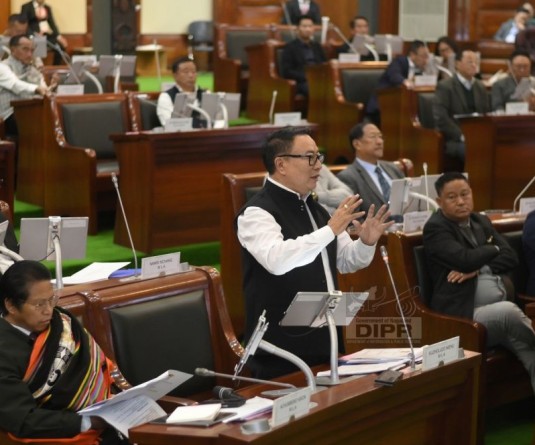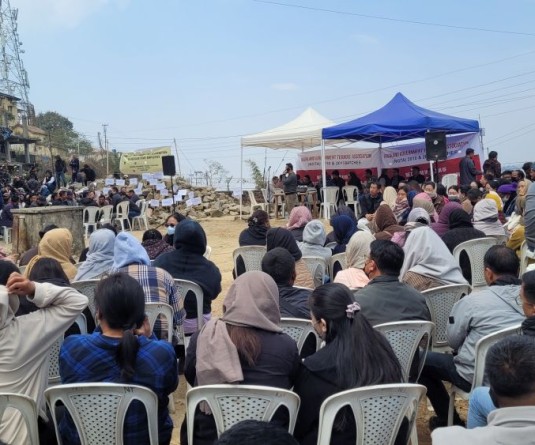Participants of the talk on Naga traditional religion held at Baptist College.

KOHIMA, SEPTEMBER 3 (MExN): The Department of Sociology, Baptist College organized a talk on Naga traditional religion. The programme, comprising of both faculty and BA 3rd semester Sociology students of the Kohima and Sechü campus, was held on September 2 at Baptist College Kohima.
Based on his research work of 8 years, the speaker, Dr Kewepfuzu Lohe, opened his talk with an emphasis on the relevance of Sociology of religion (a paper in the syllabus of the BA 3rd semester Sociology programme), stating the influence of religion on the behavior of people in society. Viewing such sociological study of religion as an opportunity for examining ourselves and to re-explore our original identity, he focused on traditional religion within the larger picture of Nagaland state.
Pointing to Chungliyimti and Makhel as the two reference point for Nagas, he made broad categorization of differences between the two groups of Nagas. The speaker further narrowed down his talk to the south Nagas, specifically to the Khezhas of Chakhesang tribe, for which he studied 17 villages: 2 from Manipur state and 15 from Nagaland state. His idea of traditional religion, under the term Medanism, is based on these 17 villages.
Having elaborated on the concept of Medanism, the speaker reverted to the idea of religion’s control over the social behavior of people and how traditional religion provides a better way of understanding society just as classical, modern and social anthropological theories have done. He pointed out that only 8 people from the 17 villages he studied were still practicing Medanism. He, however, lamented over the possibility of Medanism getting extinct with the death of those 8 persons who are largely old aged people.
The talk was followed by an intensive interaction on issues such as differences between Animism and Medansim; the subjective aspect of Medanism and its influence on the specific tribes’ way of life; the labelling and categorization of Medanism as a traditional religion; the relevance and applicability of Medanism in the context of the modern Naga; elaboration on the legend of Ropfü Razou; differences between the southern and northern Nagas; and core beliefs of Medanism.
The interaction ended with a focus on the relevance of Medanism in the present day context. The speaker concluded that with the devaluation of the concept of Kenyü along with the nominal Christian status of Nagas, there is a further breakdown of moral order. Thus, he encouraged the young students to hold on to the moral and social ethics aspect of Medanism as the ritualistic aspect remains irrelevant and impractical to the modern day Naga.
The talk was chaired by Veshetshelii Rüho and an introductory note was given by Vincent Kent (HoD). A special number was also presented by Nikil Chetri and his fellow students from BA 3rd semester. Rapporteurs for the day were Lidoba Sangtam, Thejakhrielie Kelelie (BA 3rd semester students), and Dr Videkhono Yhokha.
The speaker, Dr Kewepfuzu Lohe, is the Vice-Principal of Baptist College, Sechü campus, and also a teaching faculty in the Department of Sociology. He has written two books: Naga Village: A Sociological Study by Eastern book House: Guwahati, 2011; and Medanism and Christianity: A Sociological Study, 2022, Eastern book House: Guwahati.






